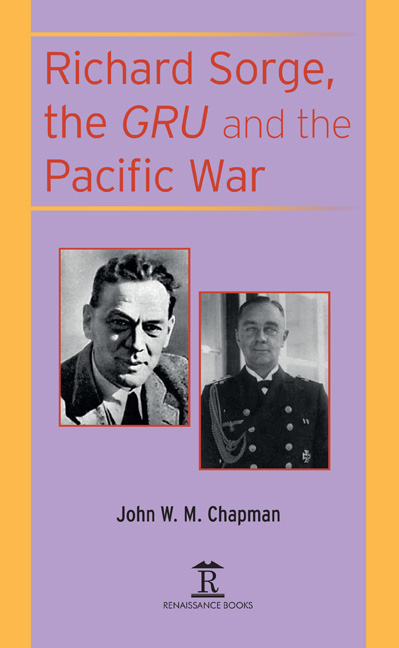Book contents
- Frontmatter
- Contents
- Chart: Organization of the People’s Commisariat for the Defence of the USSR,1941
- Preface
- Introduction
- Abbreviations
- List of Illustrations
- 1 ‘All is Not Well in the Camp of the Axis Powers’: Karl von Wiegand to Hearst Press, 20 November 1941
- 2 ‘In the Matter Affecting Ambassador Ott’
- 3 The Purge of German Journalists
- 4 ‘Expressions which are Psychologically Dangerous’: General Jodl to Admiral Wenneker 24.12.1942
- 5 The Bifurcation of Intelligence in Retrospect, 1929–1937
- 6 The Bifurcation of Intelligence in Retrospect, 1937–1941
- 7 Conclusions
- Select Bibliography
- Source Materials
- Index of Persons
- Index
- List of Contributors
- Frontmatter
- Contents
- Chart: Organization of the People’s Commisariat for the Defence of the USSR,1941
- Preface
- Introduction
- Abbreviations
- List of Illustrations
- 1 ‘All is Not Well in the Camp of the Axis Powers’: Karl von Wiegand to Hearst Press, 20 November 1941
- 2 ‘In the Matter Affecting Ambassador Ott’
- 3 The Purge of German Journalists
- 4 ‘Expressions which are Psychologically Dangerous’: General Jodl to Admiral Wenneker 24.12.1942
- 5 The Bifurcation of Intelligence in Retrospect, 1929–1937
- 6 The Bifurcation of Intelligence in Retrospect, 1937–1941
- 7 Conclusions
- Select Bibliography
- Source Materials
- Index of Persons
- Index
- List of Contributors
Summary
THE EVENTS IN the spring of 2018 in the quiet rural setting of the city of Salisbury in Wiltshire provided a sharp reminder of the highly significant role accorded by the Russian state apparatus to members of the country's covert military intelligence agencies over the past millennium and recalled the past achievements of the USSR's Chief Intelligence Office – the GRU – within the Soviet defence establishment. Arguably its most celebrated covert intelligence agent in the twentieth century was Dr Richard Sorge (1895–1944), born in Baku but of German parentage, whose role was only officially recognised in 1964 with his naming as a ‘Hero of the Soviet Union’. Knowledge of Sorge's role initially stemmed from the publication of documentary evidence linked to questioning by officials of the Japanese Tokkō, the Special Higher Police, and of the Japanese Ministry of Justice following the surrender of Japan at the end of the Pacific War in August 1945.
Immediate exploitation of Sorge's activities was available to the US Occupation and was channelled into developments arising from the onset of the American-Soviet Cold War between 1945 and 1991 and also entwined in the domestic US political controversy surrounding the enquiries into the outbreak of hostilities at Pearl Harbor on 7 December 1941. As Sorge himself served in both China and Japan as director of the GRU espionage groups there from 1930 to 1941, there are a large number of individuals with whom he made contact as a journalist and corresponding numbers of personal observations have appeared in print. One of the fullest accounts, based on German and Japanese sources, was published in 1966 by Sir William Deakin and Professor Dick Storry and there is a parallel study by Chalmers Johnson based primarily on Japanese sources on the career of Sorge's principal informant, Ozaki Hotsumi, which appeared in 1990.
Some knowledge of Sorge's activities in Japan between 1934 and October 1941 was clearly also gained from the German and Japanese communities and was of direct significance to members of the German diplomatic and press corps. Perhaps most directly affected was SS-Sturmbannführer Meisinger, the representative of the German secret police within the German Embassy in Tokyo since April 1941.
- Type
- Chapter
- Information
- Richard Sorge, the GRU and the Pacific War , pp. xi - xviiiPublisher: Amsterdam University PressPrint publication year: 2020

